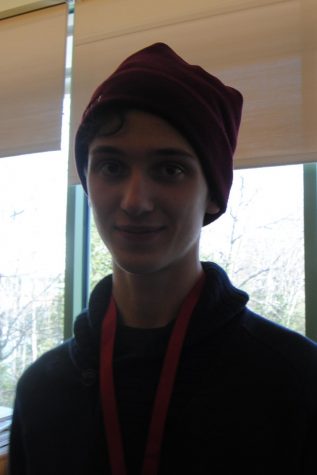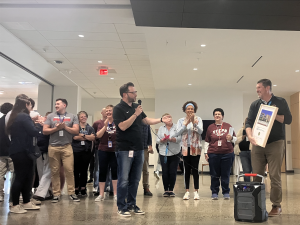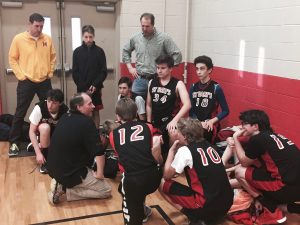We deserve senioritis
February 18, 2020
A shrill arpeggio tugged at my mind until I was lucid, and reaching wildly around in an effort to silence the alarm. The time was 7:20 am. I cursed the fact that the extra twenty minutes I gave myself the night before felt inconsequential so early in the morning. Rolling ever so slightly towards the side of the bed I would eventually dismount, I repeated my mantra of the semester in my head.
“In college, you will not pick a class that starts before 9:00 am. It will not happen.”
Comforted by dreams of a better future, I snuggled deeper into my plush sheets with my hands wrapped around my pillow.
“Colter what are you doing?”
Crap. An alarm I couldn’t turn off. Cracking open my eyes, I noticed my dad standing full business-professional, eyeing me skeptically.
“It’s 7:55, don’t you have school?”
I muttered something about a “late start,” and finally pulled myself out of bed, stumbling towards the shower. It would be around 8:40 by the time I arrived at my mandatory study block, where I am expected to complete an antiquated VDOE personal finance credit if I intend to graduate high school.
Second semester senior year should be a time of tying up loose ends, stressing about college (once you get in- how to pay for it), and spontaneous adventures with friends you probably won’t see for years to come. Think of every high school coming of age movie – The Perks of Being a Wallflower, Booksmart, Superbad. If those characters spend any time in school, it’s to share one more conversation with that teacher who really got them or to orchestrate an epic legacy-defining prank.
At George Mason, not many teachers seem to be clued in on this pop-culture memo. Whether we are anxiously preparing for IB assessments which will take place after most of us have committed to college, or desperately finalizing IAs that will make up most of our second-semester grades, high school is just about as intense as it’s ever been. And look, I’m not saying I should get a free pass to pull a Ferris Bueller and spend a few days gallivanting around D.C. But it would be nice, given we’ve spent most of our four years teaching and learning to the tests, to drop the IB mark schemes for a day and have a philosophical discussion about ancient historical narratives. Or go outside and examine the biological impacts of on-campus construction. Or engage in passionate debates about our favorite authors, and the genres they have defined.
Instead, the contrast between the allure of college and the tedium of high school couldn’t be stronger, and I’m having a hard time getting up each morning to sit for another hackneyed IB practice assignment. Even in classes I love, I am struggling to justify one more round of rote-memorization or fill-in-the-blank worksheets when curricular alternatives seem so promising, and near.
I know I should be grateful. Grades barely matter anymore, and if I want to go to a mid-week concert at 9:30, I can pretty much get away with it. It is true that by-and-large, the course-load of second semester is smaller. And in many ways, I am responsible for my disinterest in the curriculum- after all, I chose to pursue the IB diploma and all the frustrating requirements that accompany it.
Nevertheless, I can’t help but feel a sense of entitlement. After spending three and a half years desperately toiling through advanced courses, buoyed by bright spots like Journalism and English, it would be nice to finally gain more autonomy. And not just the symbolic kind in the form of externships, senior privileges, and SCA-sponsored trips to Kings Dominion.
Instead, let me test my knowledge in the field. IB seeks to facilitate real-world applications. So if I am a music student, let me take the day off to busk near the metro to practice public performance. If I am a Global Politics student, let me attend a public Senate hearing on tariff policy. Supplement these adventures with discussion-oriented classes, which grade on engagement as opposed to mastery of the final margins of course-curriculum. After all, the greatest risk Senior year poses to students is apathy and disinterest, not an incomplete understanding of derivative operations or Cold War diplomacy.
Senior year should not be considered the final preparation for the intensity of college academics. We’ve already had three of those. Instead, it should serve as a transition period, retraining students who have spent countless late nights studying for meaningless standardized tests, to search for a deeper purpose in their education. Perhaps this could help to dismantle the toxic “what-did-you-get” culture that permeates through the halls of our high school and discourages unconventional learners from looking to the future.
I am aware that the changes I am proposing are deep-cutting, existential, and probably unrealistic. But if we are not going to fundamentally reform our education system, then the least we can do is give our seniors a chance to catch a breath before phase two.










Sierra • Feb 19, 2020 at 8:52 PM
Love this! Get ready for some amazing and interesting discussions and content next year… but also a little bit of the same old stuff…